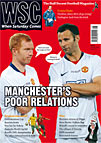 Is football in Britain any less corrupt than in other countries?
Is football in Britain any less corrupt than in other countries?
Some football clubs are immune from the global recession. One is Real Madrid who seem to be set on buying up the best players from the main Champions League rivals, another is Manchester City who are apparently prepared to pay Samuel Eto’o a basic £250,000 per week. If Eto’o’s potential employers can afford that sort of salary is of course entirely their business, although it might also be reasonable to wonder just how much money anyone needs to earn. In view of the huge amount of money sloshing about in the sport, you could also wonder why anyone would feel compelled to top up a handsome salary with extra undeclared income. The answer might be that they do it because they can.
The NGO Transparency International publishes an annual index in which countries are ranked according to the degree to which corruption is perceived to exist in public life. In the latest list, Somalia is at the bottom of the list of 180 countries, Denmark and New Zealand at the top. The UK is placed 16th, although the report only goes up to the end of 2008 so it doesn’t take into account the parliamentary expenses scandal.
A comparable chart of corrupt practices in football might produce a similar result. Indeed, when the media in other countries have reported on alleged financial malpractice in British football, the prevailing view seems to be that it’s pretty inconsequential compared to what goes on elsewhere.
That was the broad response to the 2006 Panorama documentary, Undercover: Football’s Dirty Secrets, which alleged that several well-known football figures accepted kickbacks from agents. The programme was in the news again in early June when Kevin Bond withdrew a libel claim against the BBC for having suggested that he would consider taking an illegal payment. Bond has yet to comment publicly on why he took this step.
Sam Allardyce, the only manager accused in the programme, also threatened legal action but has yet to follow it up. Harry Redknapp, who made a brief and inconsequential appearance, declar-ed before the broadcast that he was “one million per cent innocent”. He refused to talk to the BBC for a while afterwards but has since relented. Bond was sacked from his coaching role by Newcastle after the programme was broadcast but has now rejoined his old Portsmouth boss, Redknapp, at Spurs.
The BBC has 50 hours of footage from the Panorama programme that would have been shown in court. According to their columnist David Conn, the Guardian tried to obtain a copy of that footage last year only to be told that an injunction had been taken out to prevent it being seen. Bond’s silence over the matter of his withdrawn lawsuit is bound to prompt speculation over his reasons for backing down. Perhaps, like Allardyce, he just wants to get on with his life.
The FA staged their own investigation into alleged bungs in the form of Lord Stevens’s Quest report of 2007. This analysed 39 transfers involving eight clubs and found “irregularities” in 17 of them, all of which involved agents and did not relate to illegal payments made to players or club officials. The FA say that their investigation into these deals is ongoing; they have yet to bring any charges.
The Panorama investigation was prompted in part by a News of the World report in January 2006 which claimed that three Premier League managers were known to be open to receiving bungs from agents. The source for this was the then England manager Sven-Göran Eriksson. He had been recorded in conversation with a reporter posing as a sheikh who was supposedly going to offer him a job. There is no reason why Eriksson would have made up such a story as a means of impressing a future employer. If he had heard such rumours during his five years in England it seems inconceivable that they wouldn’t have also reached FA officials.
Some supporters don’t think that any of this stuff matters, that it’s all just part of the show, like Manchester City’s wild spending spree. But that’s comparable to the attitude that some hold towards politicians, reinforced by the expenses scandal, that “they’re all the same, why bother to vote at all” – a cynicism that helps to perpetuate the environment in which such abuses take place. Corruption is corrosive. It may not be endemic in football – but it can look as though the game’s administrators don’t want to dig too deep in case they don’t like what they find.
From WSC 270 August 2009